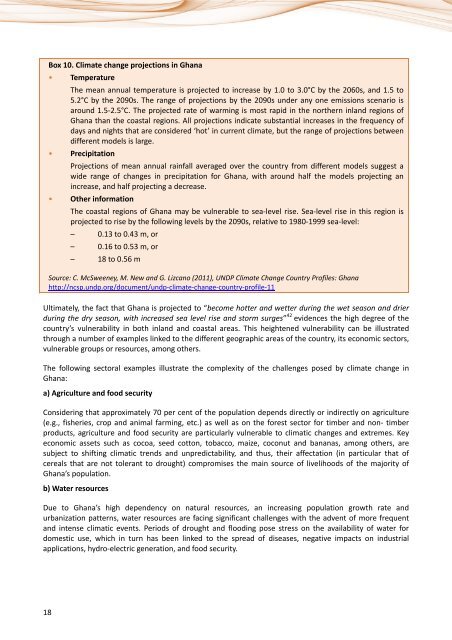Information and communication technologies (ICTs) and ... - ITU
Information and communication technologies (ICTs) and ... - ITU
Information and communication technologies (ICTs) and ... - ITU
You also want an ePaper? Increase the reach of your titles
YUMPU automatically turns print PDFs into web optimized ePapers that Google loves.
Box 10. Climate change projections in Ghana<br />
• Temperature<br />
The mean annual temperature is projected to increase by 1.0 to 3.0°C by the 2060s, <strong>and</strong> 1.5 to<br />
5.2°C by the 2090s. The range of projections by the 2090s under any one emissions scenario is<br />
around 1.5-2.5°C. The projected rate of warming is most rapid in the northern inl<strong>and</strong> regions of<br />
Ghana than the coastal regions. All projections indicate substantial increases in the frequency of<br />
days <strong>and</strong> nights that are considered ‘hot’ in current climate, but the range of projections between<br />
different models is large.<br />
• Precipitation<br />
Projections of mean annual rainfall averaged over the country from different models suggest a<br />
wide range of changes in precipitation for Ghana, with around half the models projecting an<br />
increase, <strong>and</strong> half projecting a decrease.<br />
• Other information<br />
The coastal regions of Ghana may be vulnerable to sea-level rise. Sea-level rise in this region is<br />
projected to rise by the following levels by the 2090s, relative to 1980-1999 sea-level:<br />
– 0.13 to 0.43 m, or<br />
– 0.16 to 0.53 m, or<br />
– 18 to 0.56 m<br />
Source: C. McSweeney, M. New <strong>and</strong> G. Lizcano (2011), UNDP Climate Change Country Profiles: Ghana<br />
http://ncsp.undp.org/document/undp-climate-change-country-profile-11<br />
Ultimately, the fact that Ghana is projected to “become hotter <strong>and</strong> wetter during the wet season <strong>and</strong> drier<br />
during the dry season, with increased sea level rise <strong>and</strong> storm surges” 42 evidences the high degree of the<br />
country’s vulnerability in both inl<strong>and</strong> <strong>and</strong> coastal areas. This heightened vulnerability can be illustrated<br />
through a number of examples linked to the different geographic areas of the country, its economic sectors,<br />
vulnerable groups or resources, among others.<br />
The following sectoral examples illustrate the complexity of the challenges posed by climate change in<br />
Ghana:<br />
a) Agriculture <strong>and</strong> food security<br />
Considering that approximately 70 per cent of the population depends directly or indirectly on agriculture<br />
(e.g., fisheries, crop <strong>and</strong> animal farming, etc.) as well as on the forest sector for timber <strong>and</strong> non- timber<br />
products, agriculture <strong>and</strong> food security are particularly vulnerable to climatic changes <strong>and</strong> extremes. Key<br />
economic assets such as cocoa, seed cotton, tobacco, maize, coconut <strong>and</strong> bananas, among others, are<br />
subject to shifting climatic trends <strong>and</strong> unpredictability, <strong>and</strong> thus, their affectation (in particular that of<br />
cereals that are not tolerant to drought) compromises the main source of livelihoods of the majority of<br />
Ghana’s population.<br />
b) Water resources<br />
Due to Ghana’s high dependency on natural resources, an increasing population growth rate <strong>and</strong><br />
urbanization patterns, water resources are facing significant challenges with the advent of more frequent<br />
<strong>and</strong> intense climatic events. Periods of drought <strong>and</strong> flooding pose stress on the availability of water for<br />
domestic use, which in turn has been linked to the spread of diseases, negative impacts on industrial<br />
applications, hydro-electric generation, <strong>and</strong> food security.<br />
18

















